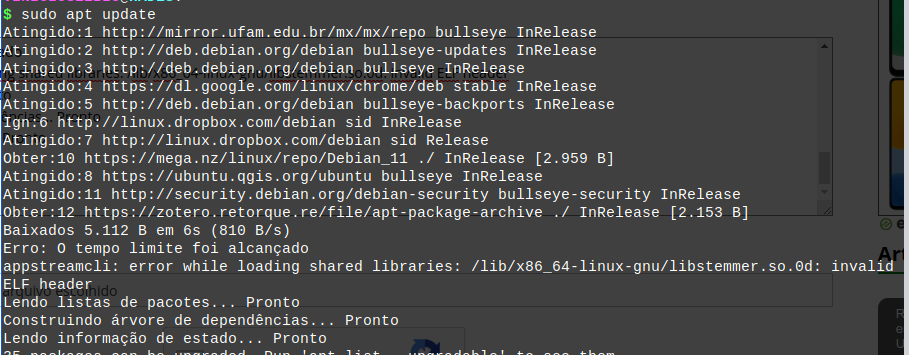Preocupado com erro com meu sistema Linux
1. Preocupado com erro com meu sistema Linux

LinuxBio
(usa Debian)
Enviado em 10/07/2022 - 15:46h
Olá, sou um iniciante no linux e comecei a usar o linux a 5 meses comecei com lubuntu, agora migrei para MXlinux a 2 meses eu inserir ele em um pendrive de 128gb como um "linux de bolso" para trabalho e deveres fora de casa. O meu sistema linux esta apresentando mensagens a "Erro: O tempo limite foi alcançado" e também a "appstreamcli: error while loading shared libraries: /lib/x86_64-linux-gnu/libstemmer.so.0d: invalid ELF header"As mensagens aparece em quase todos os processos de atualização do sistema. Mais os programas instalam normalmente.
ja testei os comandos:
dpkg --configure -a
dpkg apt --fix-broken install
comando:
sudo apt update
Atingido:1 http://mirror.ufam.edu.br/mx/mx/repo bullseye InRelease
Atingido:2 http://deb.debian.org/debian bullseye-updates InRelease
Atingido:3 http://deb.debian.org/debian bullseye InRelease
Atingido:4 https://dl.google.com/linux/chrome/deb stable InRelease
Atingido:5 http://deb.debian.org/debian bullseye-backports InRelease
Ign:6 http://linux.dropbox.com/debian sid InRelease
Atingido:7 http://linux.dropbox.com/debian sid Release
Obter:10 https://mega.nz/linux/repo/Debian_11 ./ InRelease [2.959 B]
Atingido:8 https://ubuntu.qgis.org/ubuntu bullseye InRelease
Atingido:11 http://security.debian.org/debian-security bullseye-security InRelease
Obter:12 https://zotero.retorque.re/file/apt-package-archive ./ InRelease [2.153 B]
Baixados 5.112 B em 6s (810 B/s)
Erro: O tempo limite foi alcançado
appstreamcli: error while loading shared libraries: /lib/x86_64-linux-gnu/libstemmer.so.0d: invalid ELF header
Lendo listas de pacotes... Pronto
Construindo árvore de dependências... Pronto
Lendo informação de estado... Pronto
Podem me ajudar..
Patrocínio
Site hospedado pelo provedor RedeHost.
Destaques
Artigos
A Fundação da Confiança Digital: A Importância Estratégica de uma PKI CA na Segurança de Dados
Como enviar dicas ou artigos para o Viva o Linux
Como Ativar a Aceleração por GPU (ROCm) no Ollama para AMD Navi 10 (RX 5700 XT / 5600) no Gentoo
Dicas
Cairo Dock ainda funcional nos dias de hoje
Configuração de IP fixo via nmcli e resolução de nomes via /etc/hosts no Gentoo
Removendo o bloqueio por erros de senha no Gentoo (systemd)
Papel de Parede Animado no KDE Plasma 6 (Com dicas para Gentoo)
Homebrew: o gerenciador de pacotes que faltava para o Linux!
Tópicos
Ajudante para criar dicas e artigos no VOL (29)
Hardware (corpo), Software (mente) e Kernel (conexão) (0)
Tentando fazer um "linux ricing" mas falhando miseravelmente... (3)
Top 10 do mês
-

Xerxes
1° lugar - 125.783 pts -

Fábio Berbert de Paula
2° lugar - 52.933 pts -

Buckminster
3° lugar - 30.036 pts -

Sidnei Serra
4° lugar - 21.368 pts -

Alberto Federman Neto.
5° lugar - 18.816 pts -

Daniel Lara Souza
6° lugar - 18.804 pts -

Mauricio Ferrari (LinuxProativo)
7° lugar - 18.254 pts -

Alessandro de Oliveira Faria (A.K.A. CABELO)
8° lugar - 17.260 pts -

edps
9° lugar - 15.986 pts -

Diego Mendes Rodrigues
10° lugar - 13.729 pts




